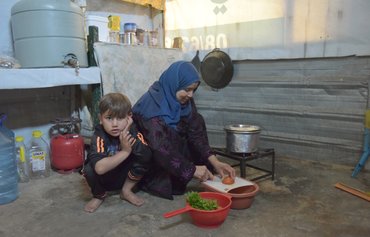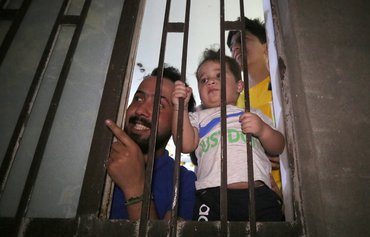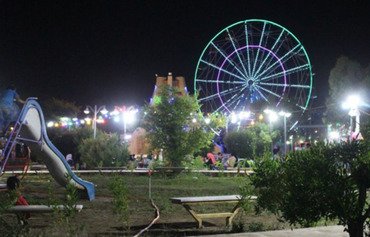Amid the jostle of pedestrians and clamour in the streets during the nights of Ramadan in Mosul, it is hard to believe that a violent war passed through the city just months ago, and that a battle is still raging in the Old City.
Since the start of the holy month of Ramadan, the markets in al-Zuhour, al-Muthanna and other commercial districts in eastern Mosul have been bursting with activity until late in the evening.
To ensure maximum security in the liberated areas, police put in place a plan for Ramadan, Ninawa province police chief Brig. Gen. Watheq al-Hamdani told Diyaruna.
"All members of the local police and Iraqi army forces are working in the city today to establish law and order and restore joy to citizens after more than two years of living under the control of terrorists," he said.
Meanwhile, Ninawa's local government has been working to provide electricity to residents during Ramadan through the national grid and private generators.
Generators are operating for longer hours during the holy month, said Ali Younis Majeed, who heads the private generators committee at the Ninawa provincial administration office.
"The province set the generators’ operating hours at 10 hours a day, from 2 p.m. to 12 p.m., at 800 Iraqi dinars per hour ($0.66)," he told Diyaruna.
Mosul sweets and Ramadan dishes
Mosul residents have been preparing their famous Ramadan dishes once again, including raisin juice, zalabya (a sweet), sujuq (a sweet made from grapes and nuts) and Mosulian kibbeh (ground meat with bulgur), as well as Mosul torshi (pickled vegetables).
A raisin juice vendor told Diyaruna that Mosul residents have resumed making the juice, for which the city is famous, to the same specifications and quality as in the past, when they used to take it as a gift to their relatives in Baghdad.
Near the juice maker's shop, business is brisk for a sweet shop preparing zalabya -- a famous Mosul sweet that is made in two colours, yellow and red -- with flour, milk and sugar.
Flour, which was scarce under the rule of the "Islamic State of Iraq and Syria" (ISIS), is now available in sufficient quantities to ensure an ample supply of the sweet, which Mosul residents traditionally enjoy after the iftar meal.
"The economic prosperity Mosul residents are now enjoying after the liberation of their city is helping to drive the buying and selling of sweets," the sweet shop owner told Diyaruna.
Aside from the famous delicacies, other Ramadan customs include visiting family and friends in the evenings and shopping for Eid al-Fitr, which is why the Nabi Younis market is crowded with shoppers until the late hours of the night.
Women can be seen strolling and shopping in the market without the restrictions that ISIS imposed on them when it controlled the city.
Displaced Iraqis continue to suffer
The relative improvement in the situation in Mosul appears to have not reached the displacement camps, however, where many residents continue to suffer from the heat and from a scarcity of food.
Although the situation in the camps varies, most must contend with an acute shortage in services and rising temperatures.
Camp residents complain that the tents have become uninhabitable, due to the heat and lack of air conditioning, because of the electricity crisis in the camp.
Others complain of the lack of cold drinking water, saying they are forced to have the iftar meal with a meagre amount of food and tepid drinking water.
"All this comes at a time when the number of internally displaced persons (IDPs) is steadily growing, as Iraqi forces advance further into west Mosul," said Ministry of Migration and Displacement spokesman Sattar Nuruz.
The number of IDPs from western Mosul alone totals about 633,000, as of June 10th, he told Diyaruna.
It is encouraging that large numbers of IDPs have begun to return to eastern Mosul, Nuruz said, adding that some 200,000 have returned, thanks to the improvement in the situation in their residential areas.

![Displaced Iraqis receive food aid during the holy month of Ramadan at al-Khazir camp, between Erbil and Mosul, on June 5th. [Karim Sahib/AFP]](/cnmi_di/images/2017/06/20/8369-Iraq-Mosul-Ramadan-600_384.jpg)






